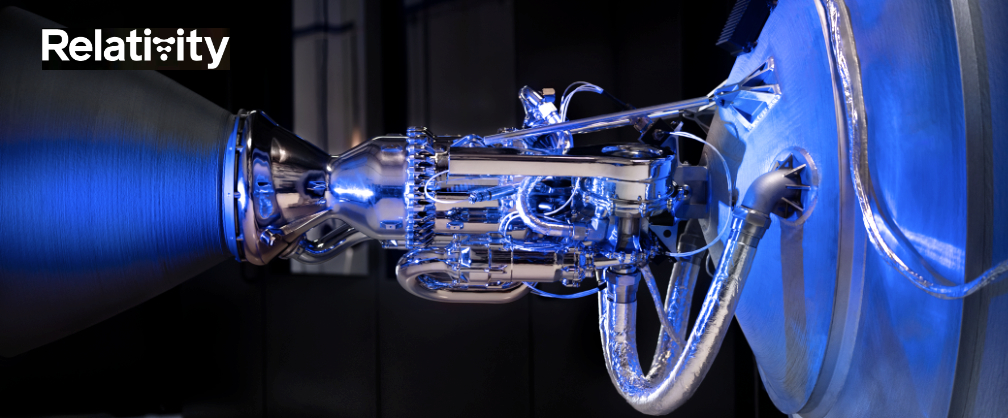
Relativity Space has signed a multi-year, multi-launch, Launch Services Agreement (LSA) with OneWeb.


Under the agreement, Relativity will launch OneWeb’s LEO satellites on Terran R, the first fully reusable and entirely 3D printed rocket, starting in 2025. These launches will support OneWeb’s deployment of that firm’s Gen 2 satellite network, which will add capacity and fresh capabilities to build upon the initial constellation of 648 satellites the company is currently building out.
Terran R will launch OneWeb missions from Launch Complex 16, Relativity’s site at Cape Canaveral Space Force Station, where the first entirely 3D printed rocket, Terran 1, is also set for its first orbital launch this year. As a medium-heavy lift, fully reusable launch vehicle made for growing satellite constellation launch demand and, eventually, multi-planetary transport, Terran R provides government and commercial customers affordable access to space, in LEO and beyond. With the addition of this multi-launch agreement with OneWeb, Relativity now has a total of five signed customers for Terran R, including multiple launches and totaling more than $1.2 billion in backlog.
Disrupting 60 years of aerospace manufacturing with 3D printing, autonomous robotics, and machine learning, Relativity’s radically simplified supply chain enables the company to print its rockets with 100x fewer parts in less than 60 days, compared to industry standards of 18 months or longer. Since its founding six years ago, Relativity has developed a new tech stack for aerospace manufacturing that centers on its Stargate printers, which are capable of 3D printing Terran 1, which is an expendable, entirely 3D printed, 110 ft. tall, 7.5 ft. wide rocket with a 3 meter payload fairing, simultaneously with Terran R – a 20X larger, fully reusable launch vehicle.
Relativity recently deployed the fourth generation of Stargate, improving its prior generation’s print speed by 10 times. Located in the company’s new 1MM+ square-foot factory headquarters, these new, fourth generation Stargate printers will allow Relativity to take its production to new heights, scale, and quality. With in-process monitoring, Stargate printers can now analyze the prints in real time, detecting any quality issues and using predictive capabilities to print fuselages to aerospace dimensional tolerances.

Tripling in size since 2020, Relativity now employs 800+ people across its Long Beach, Vandenberg, Seattle, Washington D.C., Stennis, and Cape Canaveral locations and has also begun a move to new headquarters, which has capacity for 2,000+ employees, a metallurgical laboratory, powder bed fusion printers, a mission control center, as well as dozens of the company’s proprietary Stargate 3D printers.
“We are honored to be chosen by OneWeb to help launch their Gen 2 constellation,” said Tim Ellis, Co-Founder and CEO of Relativity. “They have an incredible team, technology, and momentum as a world leader in satellite connectivity with hundreds of operational satellites already in orbit. It is clear that more disruptive launch capacity is needed in the marketplace – Relativity is developing Terran R to fill this additional demand. We cannot wait to plan, execute, and successfully launch these missions together with OneWeb.”
“We are excited about this agreement with Relativity, who we’ve long admired as a true disruptor in the aerospace manufacturing industry. Relativity will add new capacity to our launch programme well into the future,” said Massimiliano Ladovaz, CTO, OneWeb.
Relativity is building humanity’s multi-planetary future. We invented a new approach to design, print, and fly our own rockets, starting with the world’s first entirely 3D-printed rocket, Terran 1, and Terran R, a larger, fully reusable, entirely 3D-printed launch vehicle. As a vertically integrated technology platform, Relativity is at the forefront of an inevitable shift toward software-defined manufacturing. By fusing 3D printing, artificial intelligence, and autonomous robotics, we are pioneering the factory of the future. Disrupting 60 years of aerospace, Relativity offers a radically simplified supply chain, building a rocket with 100x fewer parts in less than 60 days. We believe in a future where interplanetary life fundamentally expands the possibilities for human experience. Our long-term vision is to upgrade humanity’s industrial base on Earth and on Mars.
OneWeb is a global communications network powered from space, headquartered in London, enabling connectivity for governments, businesses, and communities. It is implementing a constellation of Low Earth Orbit satellites with a network of global gateway stations and a range of user terminals to provide an affordable, fast, high-bandwidth and low-latency communications service, connected to the IoT future and a pathway to 5G.
